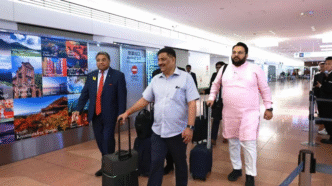Tourists in Japan: Japan’s tourism boom is in full swing, with millions of international visitors flocking to its vibrant cities, serene temples, and mouthwatering cuisine. But no destination is perfect, and the Japan Tourism Agency wanted to know what challenges foreign travelers faced during their trips. Between July and December 2024, they interviewed 4,189 tourists at major airports like Narita, Haneda, Kansai, Fukuoka, and New Chitose, asking what, if anything, bothered them. The results? A mix of familiar gripes and a surprising top response that shows just how much visitors love Japan.
What Annoyed Tourists in Japan?
The survey revealed some common frustrations, though none were dealbreakers for most travelers. Here’s a rundown of the top issues:
- 6.1% struggled with limited free Wi-Fi. Finding reliable public internet was tricky for some, especially in less touristy areas.
- 8.6% found immigration processing slow. Long waits at the airport after a long flight were a pain for some arrivals.
- 10.8% had issues with multilingual signs. Small or unclear translations on signs at train stations, hotels, or menus caused confusion.
- 12.3% were confused by public transport. Figuring out where to line up or which routes to take tripped up some travelers.
- 13.1% felt crowded at attractions. Popular spots like temples, stations, and restaurants were packed, a new complaint added to this year’s survey.
- 15.2% faced language barriers. Communicating with staff at shops, restaurants, or hotels was tough when English or other languages weren’t spoken.
- 21.9% missed public trash cans. Japan’s lack of street bins frustrated visitors, a recurring issue tied to local customs of carrying trash home.
These complaints highlight areas where Japan’s infrastructure and cultural norms can feel unfamiliar to foreigners. For example, the scarcity of trash cans stems from Japan’s etiquette of avoiding eating on the go and carrying bags to hold rubbish until it can be disposed of at home or a hotel. Recycling bins for bottles and cans, though, are easier to find near vending machines.
The Top Answer? “Nothing!”
Here’s the kicker: a whopping 51.1% of tourists said nothing bothered them at all during their trip. That’s a huge jump from last year’s 29.7% and even higher than the 2019 survey’s 36.6%. Over half of the visitors surveyed had no major complaints, suggesting that Japan is delivering unforgettable experiences despite its quirks. This could mean travelers are doing their homework, researching cultural differences, and setting realistic expectations before they arrive. When they land, they’re ready to embrace Japan’s unique charm, from its punctual trains to its polite hospitality.
Why This Matters
The survey wasn’t about tourists demanding Japan change its ways—it was simply about understanding their experiences. The fact that so many had no issues shows Japan’s appeal as a destination that blends modern convenience with rich tradition. Sure, navigating language barriers or finding a trash can might take some effort, but for most, these are small hurdles compared to the joy of exploring Kyoto’s temples, savoring sushi in Tokyo, or soaking in an onsen.
As Japan continues to welcome record-breaking numbers of tourists, this feedback can help the country fine-tune its offerings. Better signage, more Wi-Fi hotspots, or clearer transport guides could make the experience even smoother. But for now, the message is clear: most visitors are leaving Japan with smiles, not complaints.
Also Read: India-Pakistan Agree to Cease Fire, India Repeats Strong Stand on Terrorism
FAQs
1. Why are there so few trash cans in Japan?
Japan’s culture discourages eating or drinking while walking, so locals don’t generate much street trash. People typically carry bags to hold any rubbish until they can dispose of it at home or a designated spot. Recycling bins for bottles and cans are more common, often near vending machines.
2. How can tourists prepare for language barriers in Japan?
Learning a few basic Japanese phrases can go a long way. Translation apps like Google Translate are also super helpful for menus, signs, or conversations. Many tourist areas have English-speaking staff, but it’s good to be patient and prepared for occasional communication challenges.
This article is based on a report by Casey Baseel for SoraNews24, sourced from the Ministry of Land, Infrastructure, Transport and Tourism.

















